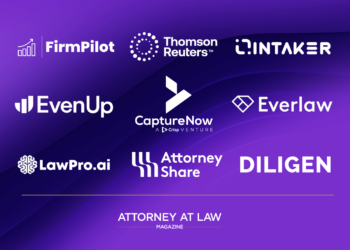Generative AI. Literally everyone is talking about it now. The AmLaws are making a big show of hiring Chief AI Officers and buying generative AI.
But are they using it? No.
I’ve met with and spoken to the heads of AI at AmLaw firms and this was essentially how the conversation went every time:
Shelton: So you have two of the biggest, most expensive legal-AI platforms available, now?
AmLaw Partner: Yes!
Shelton: How do your clients react when you tell them you’re using AI on their matters?
AmLaw Partner: Oh, we’re not using them on client matters. Right now, we’re just experimenting with the platforms.
Shelton: Ahhh. Well, it’s early-stage tech and that’s always a little glitchy. I bet they’re grateful when you tell them about the mistakes and snafus you’ve run into with the AI, aren’t they?
AmLaw Partner: Oh definitely! We’re saving them time and more importantly, errors that could cost millions!
Shelton: Cool. So how do they react when you tell them about the stuff it does right? You know, like doing first drafts of contracts and briefs? Stuff that could save them 20% or more on their legal fees. I’m curious as to how they react to that?
AmLaw Partner: <Awkward silence>
Shelton: Oh. Let me order us another Macallan.
AmLaw Partner: Sounds good!
As far as I can tell, the AmLaws are collectively posturing as if they’re innovating, while concurrently fighting against any kind of AI-related innovation with all their might. The motivation is obvious: If AI can automate just a few mundane tasks (e.g., initial drafts of briefs and contracts or doc review), it would wipe out millions of billable hours per year.
The AmLaws are still operating on an outdated business model that rewards inefficiency, so they wouldn’t be able to weather that storm.
But what about smaller firms? Nible market adapters who are willing to put value ahead of the Almighty Billable Hour?
Their arrival is inevitable and I’m on a quest to find them. If you or someone you know is actively using generative AI, in a way that securely and accurately saves clients money on legal fees, I want to hear from you.
Meet One Law Firm Doing AI Right
In the meantime, I found a firm that is doing exactly that. And their head of AI is a former AmLaw 50 attorney who has also been in-house and worked as an analyst at Goldman Sachs. Now Karina DuQuesne works at Caldera Law, a business law firm that’s based in Miami working with both national and international clients.
Shelton: How does the firm specifically use AI in its practice – including examples?
DuQuesne: The firm takes an experimental/sandbox approach to using new technologies to confirm compatibility with our other tools and systems and fit based on our client representation philosophy. We are currently experimenting with different productivity AI Tools (Microsoft Copilot, Superhuman, Motion, and a few AI transcription services), legal research tools (we are currently experimenting with Thomson Reuters GenAI tool for legal research), corporate law tools (we are currently experimenting with Spellbook AI for corporate document review and drafting), and lastly, we are looking at specific legal tech tools to manage other corporate and administrative tasks like creating closing binders, signature packets, intake process, and due diligence review.
Shelton: How does the firm discuss the use of AI with clients and/or provide affidavits about such use?
DuQuesne: We are currently operating on a client-by-client basis. Depending on client needs and requests, we will incorporate AI into any legal-specific workstreams. We are also working on creating an AI Standards Policy that we will share with our clients. This policy provides details into our general philosophy on AI and its use within our practice for legal and non-legal work.
Shelton: How does the use of AI affect pricing strategies?
DuQuesne: The use of AI allows us to provide more accurate visibility into pricing estimates as we are able to predict with better accuracy the level of effort for certain aspects of our representation, in turn, it helps us provide certain clients with a “flat rate” fee for an initial scope of work versus hourly.
Shelton: Can you give me an example of a specific task that’s currently being performed by AI on behalf of your (or other law firm) clients?
DuQuesne: There are Fortune 500 companies mandating certain legal tasks be done by AI. Examples of these tasks include creating closing binders for transactions and signature packets. As an example, there are tools like Simply Agree that can streamline these otherwise manual and time intensive processes.
Shelton: What effect do you see AI having on legal pricing structures, now and in the near future?
DuQuesne: I think over the long haul we will see that the billable hour for lower-level tasks is dead. Law firms must reimagine their cost structures and evaluate what tasks should be performed with the use of technology and which tasks will require human intervention or human-led input. Hourly rates may ultimately be a smaller piece of the revenue pie, but they may also increase as the input of attorneys, their specific knowledge and know-how will be irreplaceable.
Shelton: That’s a pretty bold prediction – and one I’ve made myself on numerous occasions! I’m quite certain that all legal tasks will be done on a two-part price structure in the future. The flat fee for the initial task performed by AI and the hourly rate for the review and Human Eyes Failsafe, that will be provided by the supervising attorney. Okay, let’s turn to the caveats and potential pitfalls. What should firms be doing to protect their clients?
DuQuesne: Our AI policy and standards will provide clients with our philosophy for AI and how it interacts with our industry. In addition, it will include ethical standards on how we intend to use AI as part of our services.
As far as pitfalls, some types of AI should be carefully scrutinized or even avoided altogether, in certain situations. For example, if a client call that would otherwise be subject to attorney-client privilege has an AI Bot present, the use of that AI transcription and summation services could jeopardize attorney-client privilege with respect to that conversation. It is important to note that AI Bots typically record and transcribe and as a default they often immediately send an email of the meeting to all participants with a copy of the recording and transcript. If that email is forwarded to individuals that were not part of the call, privilege may be lost.
Shelton: Ouch! Okay so finally, what do you see in the near future? How is the law going to change – especially for younger lawyers or those just entering law school, whose tasks seem to be most at peril?
DuQuesne: It feels like we’re being whiplashed with a tidal wave of new AI every week and even every day. So we’re already thinking through how this technology can empower our practice, provide better outcomes for our clients. From an administrative standpoint, we are also evaluating how the integration of AI tools will impact our pricing strategies, particularly for lower-level tasks. To that end, we are also eager to see how newly minted attorneys will integrate into this new world; their value-add will inevitably be materially different than a junior attorney just five years ago.









